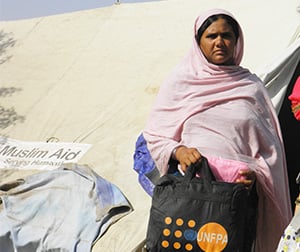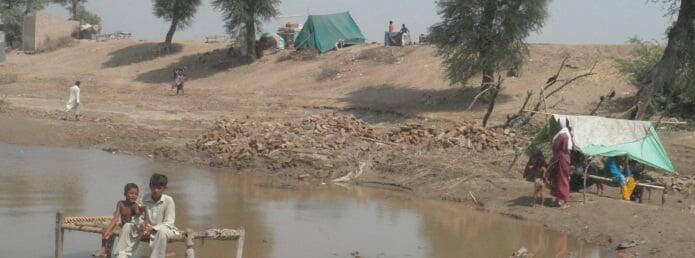PUNJAB PROVINCE, Pakistan – When torrential rains flooded Asma Bibi’s village last month, the pregnant 18 year-old was fortunate enough to reach a rural health centre in the neighbouring Jhang District, where she received basic care and health supplies.
But not all expectant mothers were able to make it to higher ground. Recent floods in Pakistan’s Punjab province severely disrupted access to health centres across the region and many displaced people, including pregnant women, were unable to reach clinics to receive the care they need.
More than 2.5 million people have been affected by the recent floods in north-eastern Pakistan, according to the latest figures from the Government’s National Disaster Management Authority (NDMA). UNFPA estimates that more than 625,000 are women of reproductive age and that at least 75,000 are pregnant.
As part of the government’s humanitarian response efforts, UNFPA and its partners are working to meet their reproductive health needs, including distributing safe delivery and dignity kits, setting up mobile clinics, and establishing a referral system for the displaced population.
Access to health facilities blocked
Asma fled her village with no time to prepare: “All the shops were closed. My house was flooded and I do not have money,” she explained after receiving a safe delivery kit and other basic hygiene supplies at the Rural Health Clinic in Rodu Sultan, a town in Punjab’s Jhang District where some of the people fleeing the rising waters were able to take shelter.

But with flooding making the area nearly inaccessible, the number of deliveries at the health clinic has fallen from 25 to eight per week.
“It has been difficult for pregnant women to come to this centre. The flood has disrupted the access to health services,” says Dr. Khan, Head of the Rural Health Clinic in Rodu Sultan.
This is the case for Sharifa, 19, whose house in the village of Rasheed Pur was destroyed. Eight months pregnant, she has been living in a nearby tent.
Most days, she is left to fend for herself as her husband leaves early in the morning and returns late at night, trying to earn money as a labourer to rebuild their home.
Sharifa has never been to a clinic to receive antenatal care. She will rely on a ‘dai’ (traditional birth attendant) to help her during delivery.
“I do not have money and transportation to reach the clinic,” she says. “These bags [newborn baby kit and clean delivery kit] will help me a lot.”
Delivering reproductive health supplies where they are needed most
UNFPA and its partner, Muslim Aid, have supported health authorities with the delivery of more than 550 clean delivery kits, newborn baby kits and dignity kits with personal hygiene items. Additional kits have been ordered and are being transported to key affected areas in Punjab Province as they become accesssible.
UNFPA and Muslim Aid are also supporting the government by setting up mobile clinics and revitalizing reproductive health services at selected health facilities.


